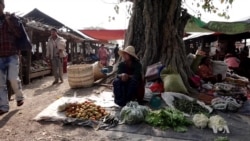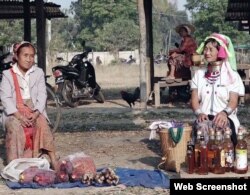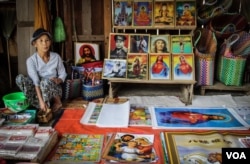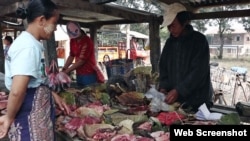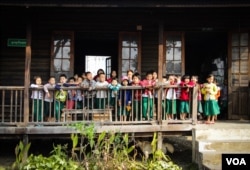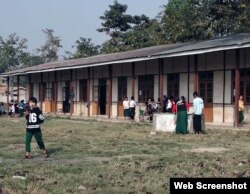The morning mist has barely risen above Demoso market in Kayah State, yet Karenni villagers from the surrounding area have already started on the local rice wine. While traders prepare their stalls for the morning rush, a throng of men surround a line of yellow jerry cans which hold the sweet liquor.
Perhaps it is just the wine, but everyone at the bustling market is moving with a sense of optimism. In less than a month, Aung San Suu Kyi’s National League for Democracy (NLD) will take over the parliament and there are high expectations among the Karenni.
“We are hopeful that the next government will be much, much better than what we have had until now… we hope that every ethnic group in Myanmar will have more freedom.” says Daw Nan as she weighs a bag of dried tea leaves on rusty scales.
Support for NLD
The NLD won a landslide victory in last year’s historic election. They won almost every seat in Kayah, a performance that was replicated in many of the ethnic states.
Observers did not expect Aung San Suu Kyi to do so well in these regions. After years of oppression at the hands of the Bamar majority, it was thought the small nationalist parties would be strong competition. This was only proven true in Shan and Rakhine State.
Perhaps as a sign of gratitude, Aung San Suu Kyi nominated three ethnic MPs for the speaker positions within Myanmar parliament. But the Karenni at Demoso market are hoping for more tangible changes at home.
Improvements sought
“The only things we want to see are better education, better healthcare and true peace across the country.” says Daw Mu Taw, an elderly woman from the Padaung tribe who is selling home-made honey in dis-used whiskey bottles.
For decades, armed ethnic groups fought against the military regime. The conflicts devastated the frontier regions; thousand of people fled the country, livelihoods were destroyed and basic services were neglected.
Like many other ethnic states, Kayah now ranks among the poorest in Myanmar. Over recent years, the government has made efforts to improve infrastructure, particularly roads, health facilities and schools but their efforts failed to impress the Karenni.
“We might have a health center but we don’t have any doctors that know how to cure people.” says Khun Kheing Tune, Demoso’s only jewelery maker.
There are also complaints that the majority of Karenni do not have access to Kayah’s new infrastructure projects; 75 percent of the population live in rural areas and nearly 90 percent of people work in agriculture.
“We are hoping that the new government will look after the rural communities and encourage development in all areas…. Under the current government we have only been allowed to work on the farms. We hope to open new businesses which will bring improvements to our area” says village leader U Shwe Hlat.
Economic potential
There is certainly economic potential in Kayah. Cross border trade could be developed with Thailand and the area is rich in natural resources, particularly timber and minerals.
But there is a distinct lack of transparency in the management of those natural resources which are controlled by organizations affiliated with the old military regime. Kayah's landscape is scarred after years of intense deforestation and profits from the tin mines are not seen among the community.
Many have turned to the illegal manufacturing of drugs as an alternative to farming. Poppy cultivation in on the increase and amphetamines are also produced locally. Unsurprisingly, the proliferation of drug production has also led an increase in consumption.
Desire for more independence
The KNPP - Kayah’s largest armed ethnic group — believes federalism is the only solution for the states socio-economic woes. They have long fought for control of the states natural resources and say they are best placed to respond to the needs of the Karenni.
“If we had our own government, it would be easier for us to talk about and solve our own community problems and the region would develop quicker. Now the community and the government are separate and we cannot discuss our problems with those at the very top.” says the KNPP secretary Ko Elia.
The KNPP are not the only party pushing for a federal system. In October 2015, eight armed ethnic groups signed a National Ceasefire Agreement which promised to ‘establish a union based on the principles of democracy and federalism.’
Those groups that did not sign the agreement, including the KNPP, have recently met in Chiang Mai to discuss how best to continue negotiations for federalism with the next government.
But while federalism may be on the agenda for the old war hands as they sit behind a negotiating table in a cool conference center, there certainly is little talk of it among the Karenni as they buy ingredients at the lively Demoso market. In fact, their motivation for voting NLD was not just based on their own needs - but of the whole country.
"I hope that they bring education, health and prosperity to the whole country, to every religion whether they be Buddhist, Christian, Muslim or Hindu… we are one big family and we are all in the same boat” says Daw Nan, as she sips her mug of warm rice wine.




